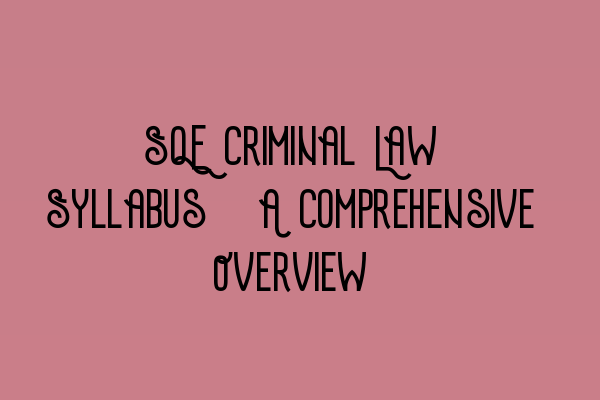SQE Criminal Law Syllabus: A Comprehensive Overview
Aspiring lawyers who wish to practice criminal law in the UK need to be well-versed in the provisions of the SQE Criminal Law Syllabus. The Solicitors Qualifying Exam (SQE) has been designed to ensure that candidates possess the necessary knowledge and skills to meet the demands of a career in criminal law.
In this article, we will provide a comprehensive overview of the SQE Criminal Law Syllabus, highlighting the key topics and areas of study that candidates need to focus on. We will also discuss the importance of proper preparation and recommend relevant resources to help you succeed in the SQE Criminal Law exam.
Overview of the SQE Criminal Law Syllabus
The SQE Criminal Law Syllabus covers a wide range of topics, aiming to equip candidates with a solid foundation in criminal law principles and practice. The syllabus is divided into several key areas, each requiring in-depth understanding and application.
1. General Principles of Criminal Law
As a candidate, you will need to demonstrate knowledge of the fundamental principles of criminal law, such as the concept of actus reus and mens rea, the elements of a criminal offense, and the various defenses available to defendants.
2. Offenses Against the Person
This section of the syllabus focuses on offenses involving harm or injury to an individual. Topics covered include murder, manslaughter, assault, battery, and other related offenses. Candidates must be familiar with the elements of each offense, the relevant legal tests, and any applicable defenses.
3. Property Offenses
This area covers offenses related to property, such as theft, robbery, burglary, criminal damage, and fraud. Candidates should have a clear understanding of the elements of these offenses, the different types of property, as well as the relevant legal frameworks and defenses available.
4. Public Order Offenses
Public order offenses refer to conduct that disturbs public peace and order. This section covers offenses such as breach of the peace, rioting, affray, and public order offenses related to demonstrations or protests. Candidates must be familiar with the elements of these offenses, the relevant legislation, and any defenses that may apply.
5. Drug Offenses
Drug offenses involve the unlawful possession, production, or supply of controlled substances. Candidates will need to demonstrate an understanding of the relevant legislation, the different classes of drugs, and the penalties associated with drug offenses.
6. Sexual Offenses
Sexual offenses encompass a wide range of offenses, including rape, sexual assault, and indecent exposure. Candidates should be well-versed in the relevant legislation, the elements of each offense, and any defenses that may arise in sexual offense cases.
7. Sentencing and Criminal Procedure
This section focuses on the sentencing process in criminal cases and the general principles of criminal procedure. Candidates should have a sound knowledge of the different types of sentences, factors influencing sentencing decisions, and the various stages of the criminal process, from arrest to trial.
Preparation and Resources
Proper preparation is vital to succeed in the SQE Criminal Law exam. Here are some resources and courses that can help you in your preparation:
- SQE 1 Practice Exam Questions – Test your understanding of criminal law concepts and principles with these practice questions.
- SQE 1 Practice Mocks FLK1 FLK2 – Simulate exam conditions and assess your knowledge and skills with these practice mocks.
- SQE 2 Preparation Courses – Enhance your understanding of criminal law and develop essential legal skills with these comprehensive preparation courses.
- SQE 1 Preparation Courses – Get a thorough understanding of the foundational concepts needed for the SQE Criminal Law exam with these specialized courses.
- SRA SQE Exam Dates – Stay updated with the latest exam dates and deadlines to plan your study schedule effectively.
In conclusion, the SQE Criminal Law Syllabus covers a wide range of topics that aspiring criminal lawyers must be well-versed in. By dedicating sufficient time and utilizing relevant resources, candidates can increase their chances of success in the SQE Criminal Law exam. Make sure to take advantage of the practice questions, mocks, and preparation courses mentioned above to enhance your understanding and skills in criminal law.
Remember, thorough preparation and a deep understanding of the SQE Criminal Law Syllabus are key to excelling in the exam and launching a successful career in criminal law.
